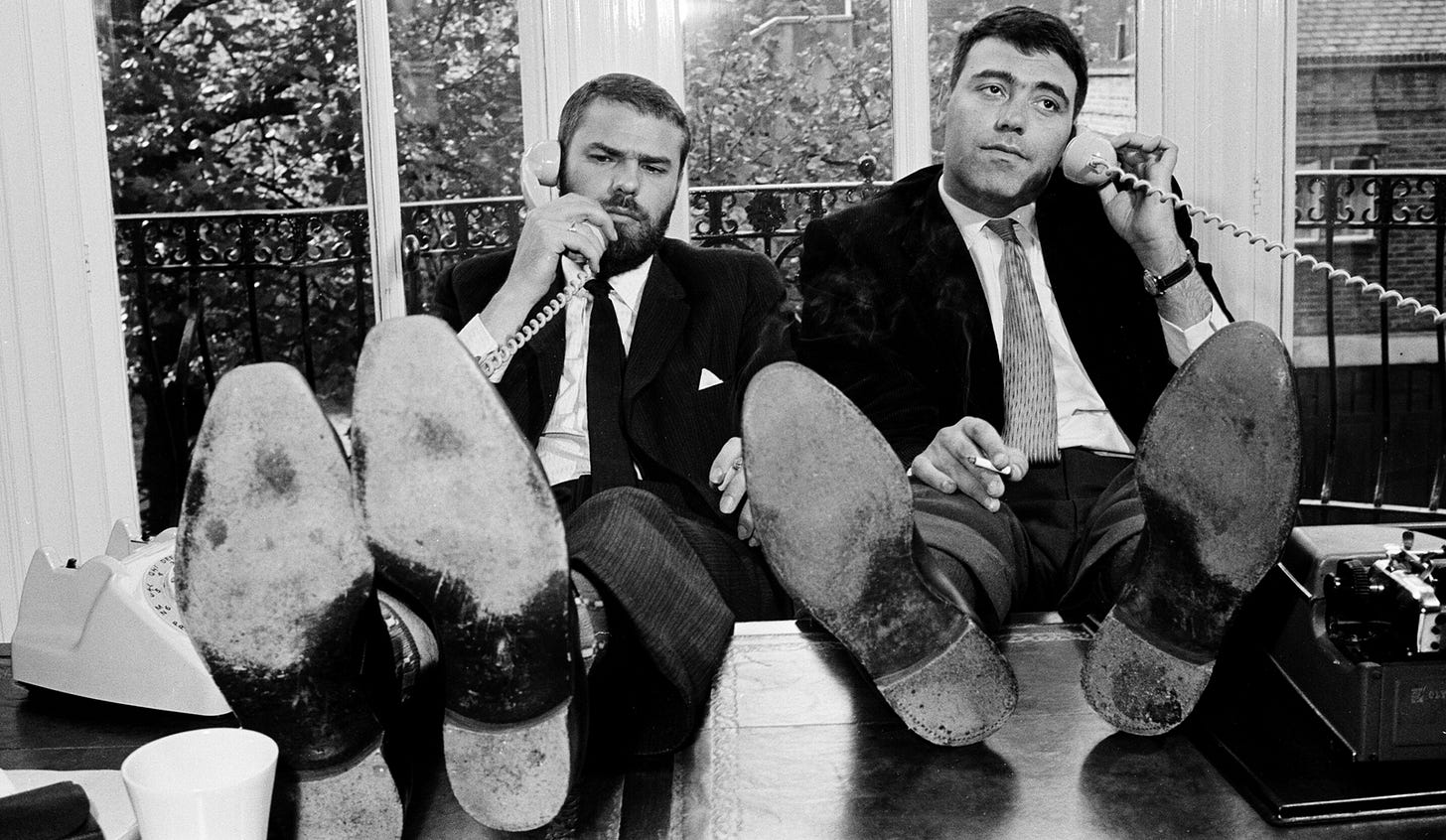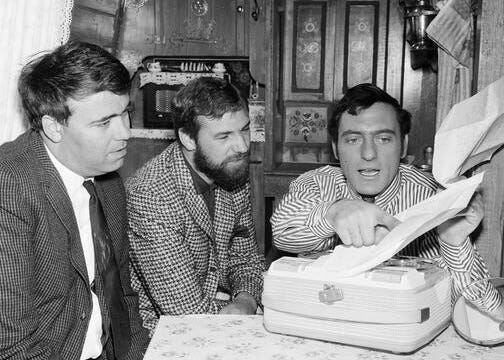Half an Hour with Galton and Simpson
Two decades ago I met Ray Galton and Alan Simpson for a pint, listening in wonder as the legendary scriptwriting duo reminisced about Hancock, Steptoe and London living. Grab a beer and come join us.
Ray Galton and Alan Simpson go back a long way with London, clearly their kind of town. Best friends for nigh on 70 years, they immortalised Cheam with a little help from Tony Hancock, and Shepherd's Bush thanks to the roving dustcart of rag and bone favourites Steptoe and Son, helping to create a nation of telly addicts in the process.
Sharing tuberculosis and a love of comedy, Galton, born in Paddington in 1930 (d. 2018), and Simpson, born in Brixton a year earlier (d. 2017), first met in 1948 at the Surrey sanatorium where they were both being treated.
"We were very much alike," explained Simpson. We had the same sense of humour and the same terms of reference, and though we'd never thought of writing before, we had a crack at it to pass the time. That's how we began our careers."
"A young patient," added Galton, "who was also an engineer, put in a complete new public announcement network for the sanatorium, turning a linen cupboard into a basic studio. That's where we broadcast our very first routines, although we weren't very good."
After three years each inside, Galton and Simpson made a slight living selling jokes to the BBC before meeting Tony Hancock and creating a ground-breaking new show for the troubled comedian, a sitcom without punchlines or musical interludes.
"Audiences connected with the Hancock character, but we invented him," stresses Galton. "Nothing we wrote applied to Tony's real life - it was all dredged up from our lives and experiences. Everything he had to say, all his attitudes, came from us."
Given absolute freedom by the BBC and only rarely interfered with by Hancock, Galton and Simpson wrote more than 160 Half Hours for radio and television, from The Blood Donor ("A pint... that's very nearly an armful.") to The Missing Page ("Johnny Oxford pointed his finger at... Men are you skinny, do you have sand kicked in your face..?"), and the public couldn't get enough.
"In the Fifties," remembered Simpson, "there was no such thing as video, no such thing as television in pubs, so every Friday at 8pm the streets would be deserted for Hancock, and then half an hour later everyone would go down the pub. We used to get figures of 20 million in those days, when only about 75% of the country had TV sets."
Finally the boys had a little cash to throw around, so they splashed out on their first cars. "Back in the '50s, cars were still a novelty," explained Galton.
"There was barely any traffic and you could park wherever you liked. Even if you felt like shopping in town, around Piccadilly or along Regent Street, you could park your car outside whichever shop you wanted to go in." "The fact that we had cars used to amaze people," recalled Simpson with a laugh. "I remember strangers walking up to me saying, 'cor, it's a car, I bet that goes fast'. Now nothing goes fast in London because there's so much bloody traffic."
True enough, but at least we're free from killer fog. "I remember driving home when the fog came in and, forget it, you had to abandon your car," grumbled Galton.
"We were recording in a West End theatre, and the fog was pouring in, so much so that if you sat at the back of the stalls you could hardly see the stage at all. Monet painted London in the fog because he thought it was romantic, but it killed a lot of old people and coughing sparrows don't make much of a dawn chorus!"
Choking wildlife aside, nothing could separate the writers from the city that inspired them. "London has been a part of all our working life," stressed Galton.
"First we had an office above a greengrocer's shop with Spike Milligan and Eric Sykes, then we moved to Kensington High Street, and then across the park to a house on the Bayswater Road, and finally to Brook Street, near Oxford Street."
Following Hancock's phenomenal success, the BBC asked Galton and Simpson to create a new show for them, a lengthy process which eventually led to Steptoe and Son, the tale of an ancient, scheming, repellent old geezer (Wilfrid Brambell) and his desperate-to-escape but chronically dutiful middle-aged son (Harry H. Corbett). The Fifties may have belonged to Hancock, but the Sixties and all-colour Seventies were Steptoe all the way, a junkyard-based bonanza of meteoric ratings and enduring fame for all involved.
"At first, we didn't want to write Steptoe," admitted Galton, "as we'd already spent ten years locked in to Hancock's Half Hour, but the harder we worked on it, the more clearly we could see the series' potential. Eventually, the viewing figures exceeded anything that had come before, and just about everything that has come since."
What’s your favourite Hancock or Steptoe memory?






This pair were writing geniuses. I recall the Hancock where he was being persecuted and put down by some strange unknown letter writer that turned out to be Hancock. Steptoe was almost too good, Shakespearean stuff. Sorry, I gush.
I’ve no quarrel with celebrating Galton and Simpson — they broke new ground and changed British comedy forever. But I think we do them (and Hancock) a disservice when we turn the story into sentimental folklore.
They didn’t “invent” Hancock. They wrote for him, yes, but what made it work was his performance — the insecurity, the wounded pride, the timing that turned half-decent dialogue into art. Without Hancock, Sid James and Bill Kerr grounding him, much of that writing would have stayed where it began: clever ideas, unevenly built.
Galton and Simpson were pioneers, but pioneers aren’t necessarily masters. Their work was often raw, even amateurish, and it was the actors who carried it into legend. Hancock wasn’t a passenger in their creation — he was the engine.
We can admire their innovation without pretending their polish matched their ambition. The miracle of Hancock’s Half Hour isn’t that two young writers invented something perfect — it’s that imperfection, in the right hands, became genius.